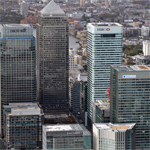London reasserts its leadership
London's status as one of the leading financial centres in the world remains undiminished, with top global companies still flocking to the UK capital, says Sir Andrew Cahn, chief executive of UK Trade & Investment.
Capital draw: UK Trade & Investment chief executive Sir Andrew Cahn (top) says that China Construction Bank's decision to locate its European headquarters in London's Canary Wharf (above) demonstrates that the city is still the leading financial center
When China Construction Bank, the world's second largest bank by market capitalisation, established its European headquarters in Canary Wharf in June, this was one of many recent votes of confidence in London's continuing leadership post the financial crisis. Speaking earlier in the year, Shaolin Xiao, CEO of the new operation, said: "International operations form an integral element of our strategy and the City of London is a fundamental component of this network."
In spite of the severe retrenchment in financial services globally, banking remains a vital web of intermediation linking those with excess capital to those that need it. Today, for example, it has a key role to play linking surplus capital from Asia and the Middle East to developing countries in need of funds to build infrastructure. Given time, banking will inevitably recover and London has a strong role to play in leading this recovery.
This is not to say that banking can recover unchanged. Both the UK authorities and London's City practitioners recognise this. Our regulators are leading the debate about how the model should evolve to ensure that the past year's costly crisis is not repeated, while practitioners are even now moving swiftly to adapt to new realities.
Capacity for reinvention
Indeed, Lord Turner, chairman of the UK's Financial Services Authority, is widely recognised to have written one of the best analyses of the crisis. The continuing debate in the UK about the future of regulation illustrates how the country is striving to contribute to a globally more robust banking system.
In the heat of the crisis at the end of 2008, some questioned whether it would hurt London's standing as Europe's, and arguably the world's, leading financial centre. Certainly, the evidence suggests otherwise. London's infrastructure remains strong in areas such as corporate governance and support to financial activities including accountancy, tax and legal expertise, with the world's top legal and accountancy firms basing their European headquarters in London.
Furthermore, the culture of continuous reinvention is undiminished. Witness the recent establishment of entrepreneurial boutiques in sectors such as trading and debt advisory, with new firms like IlliquidX, Amias and Berman & Co. And look at how leading hedge fund managers GLG Partners, Man Group and Odey Asset Management are launching onshore UCITS in anticipation of tougher regulation.
Proven resilience
Our own UK Trade & Investment inward investment figures for the 12 months to end March 2009 recorded a total of 130 new financial services projects as companies from across the Americas, Asia and EMEA opened in the UK during the period, up from 108 the previous year. This demonstrates the robustness of London, although the scale of many new operations was smaller than in previous years.
And the UK continues to forge links with other countries. For example, the India Infrastructure Finance Company, backed by the Indian government, opened its first overseas office in London in 2008. At the same time, 3i, one of the UK's oldest private equity firms, is investing a $1.2bn fund dedicated to Indian infrastructure projects. Furthermore, China Merchant Bank, China's sixth largest bank, opened a London representative office in July.
More than ever, London's strength lies in its openness, fairness and capacity for reinvention. Sound corporate governance, progressive regulation, a level playing field and sophisticated infrastructure will ensure it remains a leading partner to financial institutions, companies and governments from all over the world for many years to come.
UK Trade & Investment
UK Trade & Investment is the government organisation that supports both companies in the UK doing business internationally and overseas enterprises seeking to set up or expand in the UK. Its role is to help companies to realise their international business potential through knowledge transfer and ongoing partnership support. To support its aim to "enhance the competitiveness of companies in the UK through overseas trade and investments and attract a continuing high level of quality foreign direct investment", UK Trade & Investment will be the catalyst to help businesses prosper. As the UK government's international business development organisation, its services bring together a network of business sector specialists and support teams around the UK and in British embassies and posts all around the world.
Contact Details
Telephone number: +44(0)207 215 8000
Website: www.uktradeinvest.gov.uk




